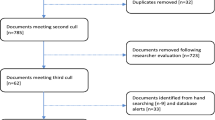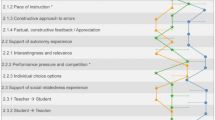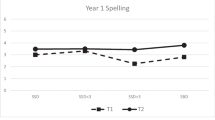Abstract
The article describes the background to, and implementation of, the Gauteng Primary Language and Mathematics Strategy (GPLMS) in South Africa from 2010 to 2014—an initiative aimed at system-wide instructional improvement in the Global South. Working in over 1000 underperforming primary schools in poor- and working-class communities, the government-led GPLMS combined scripted lesson plans, provision of quality learner materials and personalised instructional coaching to enable teachers to adopt more effective instructional practices.
Similar content being viewed by others
Notes
The study results speak only to the impact of the intervention on a limited pool of the intervention schools and cannot be generalised to all schools that were part of the intervention. The study also focuses on only one indicator, Grade 3 mathematics. The study compared programme impact by comparing arbitrarily selected better-performing intervention schools to similar schools that were not part of the intervention.
References
Ball, D., & Cohen, D. K. (1996). Reform by the book: What is—Or might be—The role of curriculum materials in teacher learning and instructional reform? Educational Researchers, 25, 6–14.
Banerjee, A. V., Cole, S., Duflo, E., & Linden, L. (2007). Remedying education: Evidence from two randomized experiments in India. The Quarterly Journal of Economics, 122(3), 1235–1264.
Barber, M. (2008). Instruction to deliver. London: Methuen.
Beatty, B. (2011). The dilemma of scripted instruction: Comparing teacher autonomy, fidelity, and resistance in the Froebelian kindergarten, Montessori, direct instruction, and success for all. Teachers College Record, 113(3), 395–430.
Bizos, E. N. (2009). Authoring lives: A case study of how grade 6 children in a South African township construct themselves as readers and writers. PhD thesis, University of the Witwatersrand, Johannesburg.
Botha, D. (2007). Early childhood literacy and emergent bilingualism: Vocabulary teaching and learning in one Soweto classroom. Honours thesis, University of the Witwatersrand, Johannesburg.
Carnoy, M., Chisholm, L., & Chilisa, B. (2015). The low achievement trap: Comparing schooling in Botswana and South Africa. HSRC Press.
Chisholm, L. (2003). The state of curriculum reform in South Africa: The issue of Curriculum 2005. State of the nation. South Africa, 2004, 268–289.
Christie, P. (1998). Schools as (dis)organisations: The ‘breakdown of the culture of learning and teaching’ in South African schools. Cambridge Journal of Education, 28(3), 283–300.
City, E. A., Elmore, R. A., Fiarman, S., & Teitel, L. (2009). Instructional rounds in education: A network approach to improving teaching and learning. Cambridge, MA: Harvard Education Press.
Cohen, D. K. (2011). Teaching and its predicaments. Cambridge, MA: Harvard University Press.
Cohen, D. K., Raudenbush, S. W., & Ball, D. L. (2003). Resources, instruction, and research. Educational Evaluation and Policy Analysis, 25, 119–142.
Cohen, D. K., & Spillane, J. (1993). Policy and practice: The relations between governance and isntruction. In S. Fuhrman (Ed.), Designing coherent education policy: Improving the system. San Francisco: Jossey-Bass.
De Clercq, F. (1997). Policy intervention and power shifts: An evaluation of South Africa’s education restructuring policies. Journal of Education Policy, 12(3), 127–146.
De Clercq, F. (2014). Improving teachers’ practice in poorly performing primary schools: The trial of the GPLMS intervention in Gauteng. Education as Change, 18(2), 303–318.
De Clercq, F., & Shalem, Y. (2014). Teacher knowledge and employer-driven professional development: a critical analysis of the Gauteng Department of Education programmes. Southern African Review of Education with Education, 20, 129–147.
Department of Basic Education. (2012). Report on the annual national assessment of 2012. Pretoria: Department of Basic Education.
Department of Basic Education. (2013). Report on the annual national assessment of 2013. Pretoria: Department of Basic Education
Dixon, K. (2010). Literacy, power and the schooled body: Learning in time and space. New York: Routledge.
Earl, L., Fullan, M., Leithwood, K., & Watson, N. (2000). OISE/UT evaluation of the implementation of the National Literacy and Numeracy Strategies. Summary: First annual report. Watching & learning. Annesley, UK: Department for Education and Skills.
Elmore, R. (2010). Institutions, improvement and practice. In A. Hargreaves & M. Fullan (Eds.), Change wars. Bloomington, IN: Solution Tree.
Elmore, R. F., & Burney, D. (1997). Investing in teacher learning: Staff development and instructional improvement in Community School District #2, New York City. New York: National Commission on Teaching & America’s Future, Teachers College, Columbia University.
Fiske, E. B., & Ladd, H. F. (2004). Elusive equity: Education reform in post-apartheid South Africa. Washington: Brookings Institution Press.
Fleisch, B. (2002). Managing educational change: The state and school reform in South Africa. Johannesburg: Heinemann.
Fleisch, B. (2008). Primary education in crisis: Why South African schoolchildren underachieve in reading and mathematics. Cape Town: Juta.
Fleisch, B., & Schöer, V. (2014). Large-scale instructional reform in the Global South: Insights from the mid-point evaluation of the Gauteng Primary Language and Mathematics Strategy. South African Journal of Education, 34(3), 1–12.
Fleisch, B., Schöer, V., Roberts, G., & Thornton, A. (2016). System-wide improvement of early-grade mathematics: New evidence from the Gauteng Primary Language and Mathematics Strategy. International Journal of Educational Development, 49, 157–174.
Fleisch, B., Taylor, S., Schöer, V., & Mabogoane, T. (2015). A report of the findings of the impact evaluation of the Reading Catch-Up Programme. Manuscript with author.
Friedman, W., Gerard, F., & Ralaingita, W. (2010). International independent evaluation of the effectiveness of Institut pour l’Education Populaire’s ‘Read-Learn-Lead’ (RLL) program in Mali. Mid-term report. Research Triangle Park, NC: RTI International.
Fullan, M. (2010). Large-scale reform comes of age. Journal of Educational Change, 10, 101–113.
Fullan, M., & Boyle, A. (2014). Big-city school reforms: Lessons from New York, Toronto and London. New York: Teachers College Press.
Gains, P. (2010). Learning about literacy: Teachers’ conceptualisations and enactments of early literacy pedagogy in South African Grade One classrooms. PhD thesis, University of the Witwatersrand, Johannesburg.
Gallucci, C., Van Lare, M. D., Yoon, I. H., & Boatright, B. (2010). Instructional coaching building theory about the role and organizational support for professional learning. American Educational Research Journal, 47(4), 919–963.
Ganasi, R. (2010). The reading experiences of Grade Four children. MEd research report, University of KwaZulu-Natal, Durban.
Glewwe, P. (2002). Schools and skills in developing countries: Education policies and socioeconomic outcomes. Journal of Economic Literature, 40(2), 436–482.
Hargreaves, A. (2003). Teaching in the knowledge society: Education in the age of insecurity. New York: Teachers College Press.
He, F., Linden, L., & MacLeod, M. (2008). How to teach English in India: Testing the relative productivity of instruction methods within the Pratham English language education program. New York: Columbia University. Mimeographed document.
Howie, S., Venter, E., & Van Staden, S. (2008). The effect of multilingual policies on performance and progression in reading literacy in South African primary schools. Educational Research and Evaluation, 14(6), 551–560.
Janks, H. (2014). Globalisation, diversity, and education: A South African perspective. The Educational Forum, 78(1), 8–25.
Jansen, J. D. (1998). Curriculum reform in South Africa: A critical analysis of outcomes-based education. Cambridge Journal of Education, 28(3), 321–331.
Jansen, J. D. (2002). Political symbolism as policy craft: Explaining non-reform in South African education after apartheid. Journal of Education Policy, 17(2), 199–215.
Jansen, J., & Taylor, N. (2003). Educational change in South Africa 1994–2003: Case studies in large-scale education reform. (http://jet.org.za/publications/research/Jansen%20and%20Taylor_World%20Bank%20report.pdf)
Katz, J. (2014). Vula Bula: Basal Readers in African Languages. In Paper Presented at the South African Education Research Association Meeting. Durban.
Koornhoff, H. (2011). From conception to consumption: An examination of the intellectual process of producing textbooks for the Foundation Phase in South Africa. MEd, University of the Witwatersrand, Johannesburg.
Kruizinga, A. (2010). An evaluation of guided reading in three primary schools in the Western Cape. MA thesis, University of Stellenbosch, Stellenbosch.
Lucas, A. M., McEwan, P. J., Ngware, M., & Oketch, M. (2013). Improving early-grade literacy in East Africa: Experimental evidence from Kenya and Uganda (Unpublished manuscript).
Macdonald, C. (2002). Are children still swimming up the waterfall? A look at literacy development in the new curriculum. Language Matters, 33(1), 111–141.
Macdonald, C. (2006). The properties of mediated action in three different literacy contexts in South Africa. Theory and Psychology, 16(1), 51–80.
Mackie, J. M. (2007). Beyond learning to read: An evaluation of a short reading intervention in the Ilembe District of KwaZulu-Natal. MEd research report, University of KwaZulu-Natal, Durban.
Malone, H. J. (Ed.). (2013). Leading educational change: Global issues, challenges, and lessons on whole-system reform. Teachers College Press.
Maphumulo, T. (2010). An exploration of how Grade 1 isiZulu teachers teach reading. MEd thesis, University of KwaZulu-Natal, Durban.
Masterson, L. (2013). A case study of Foundation Phase teachers’ experiences of literacy coaching in the GPLMS programme. Doctoral dissertation.
Maswanganye, B. (2010). The teaching of First Additional Language reading in Grade 4 in selected schools in the Moretele Area Project Office. MEd thesis, University of South Africa, Pretoria.
McEwan, P. J. (2013). Improving learning in primary schools of developing countries: A meta-analysis of randomized experiments. Unpublished manuscript, Wellesley College, Wellesley, MA.
Molotsi, G. (2015). An exploration of teachers’ view and experiences toward the use of Gauteng Primary Literacy and Mathematics Strategy (GPLMS) Lesson Plans with and without coaches. Doctoral dissertation, Faculty of Humanities, University of the Witwatersrand.
Mourshed, M., Chijioke, C., & Barber, M. (2010). How the world’s most improved school systems keep getting better. New York: McKinsey & Company.
National Education Evaluation and Development Unit (NEEDU). (2014). National Report 2013: Teaching and learning in rural primary schools. Pretoria: NEEDU.
O’Day, J. A., Bitter, C. S., & Gomez, L. M. (2011). Education reform in New York City: Ambitious change in the nation’s most complex school system. Cambridge, MA: Harvard Education Press.
Piper, B., & Korda, M., (2011). EGRA Plus: Liberia. Program Evaluation Report. Research Triangle Park, NC: RTI International.
Piper, B., Zuilkowski, S. S., & Mugenda, A. (2014). Improving reading outcomes in Kenya: First-year effects of the PRIMR Initiative. International Journal of Educational Development, 37, 11–21.
Place, J. (2005). The college book sack project in the Kwena Basin farm schools of Mpumalanga: A case study. PhD thesis, University of the Witwatersrand, Johannesburg.
Pretorius, E., & Currin, S. (2010). Do the rich get richer and the poor poorer? The effects of an intervention programme on reading in the home and school language in a high poverty multilingual context. International Journal of Educational Development, 30, 67–76.
Pretorius, E., & Mokhwesana, M. (2009). Putting reading in Northern Sotho on track in the early years: Changing resources, expectations, and practices in a high poverty school. South African Journal of African Languages, 1, 54–73.
Raudenbush, S. W. (2005). Advancing educational policy by advancing research on instruction. American Educational Research Journal, 45, 206–230.
Reddy, V., & Prinsloo, C. H. (2015). The meaning and utility of TIMSS data for systemic and school change: highlights from TIMSS 2011: South Africa.
Reeves, C., Heugh, K., Prinsloo, C. H., Macdonald, C., Netshitangani, T., Alidou, H., et al. (2008). Evaluation of literacy teaching in primary schools in Limpopo. Polokwane: Limpopo Department of Education.
Sarason, S. B. (1966). The school culture and processes of change. College of Education, University of Maryland.
Sayed, Y., Alhawsawi, S., Mwale, S., & Van Niekerk, R. (2013). The state and education policy change in South Africa: Walking the tightrope between choice and equity. In D. Turner & H. Yolcu (Eds.), Neo-liberal educational reforms: A critical analysis. London: Routledge.
Shindler, J., & Fleisch, B. (2007). Schooling for all in South Africa: Closing the gap. International Review of Education, 53(2), 135–157.
Snilstveit, B, Stevenson, J, Phillips, D, Vojtkova, M, Gallagher, E, Schmidt, T, Jobse, H, Geelen, M, Pastorello, M, & Eyers, J. (2015). Interventions for improving learning outcomes and access to education in low—And middle—Income countries: A systematic review, 3ie Final Review. London: International Initiative for Impact Evaluation (3ie)
Spaull, N. (2011). A preliminary analysis of SACMEQ III South Africa S.E.W.P. 11/11. Stellenbosch: University of Stellenbosch.
Taylor, S. (2015). Early grade reading study: Baseline data collection and year 1 activities. Manuscript with author.
Taylor, N., Van der Berg, S., & Mabogoane, T. (2013). Creating effective schools. Cape Town: Pearson.
Tucker, M. S. (2011). Surpassing Shanghai: An agenda for American education built on the world’s leading systems. Cambridge, MA: Harvard Education Press.
Author information
Authors and Affiliations
Corresponding author
Rights and permissions
About this article
Cite this article
Fleisch, B. System-wide improvement at the instructional core: Changing reading teaching in South Africa. J Educ Change 17, 437–451 (2016). https://doi.org/10.1007/s10833-016-9282-8
Published:
Issue Date:
DOI: https://doi.org/10.1007/s10833-016-9282-8




